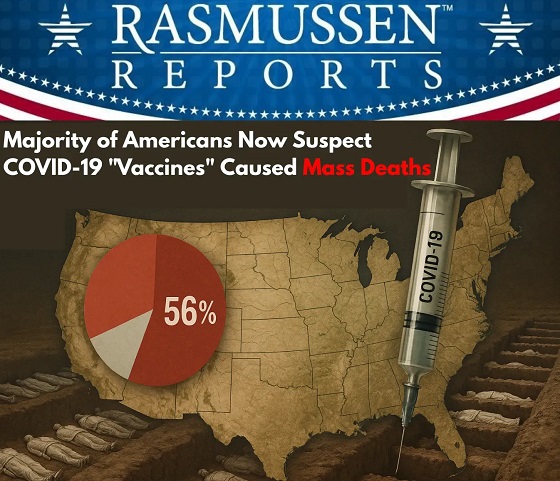Autism
Secretary Kennedy’s Key Remark at Autism Press Conference

By John Leake
“Some 40% to 70% of mothers who have children with autism believe that their child was injured by a vaccine.”
Within medical freedom circles, much of the commentary on the September 22 press conference has focused on Tylenol being presented as the prime suspect for the autism epidemic.
While President Trump’s medical advisors chose to focus exclusively on Tylenol—therefore revealing that they have, to some degree, been captured by the Vaccine Cartel—HHS Secretary Kennedy managed to make what I believe to be the most important statement of the press conference.
Finally, autism is a complex disorder with multifactorial etiology. We are continuing to investigate a multiplicity of potential causes where no areas of taboo. One area that we are closely examining, as the president mentioned, is vaccines. Some 40% to 70% of mothers who have children with autism believe that their child was injured by a vaccine. President Trump believes that we should be listening to these mothers instead of gaslighting and marginalizing them, like prior administrations.
As Andy Wakefield has been saying for almost thirty years, the key to determining the cause of autism lies in the witness testimony of mothers.
In the matter of autism, mothers are the best witnesses because they “keep their attention fixed upon what lies nearest”—namely, the behavior, moods, and health of their infants.
It is an astonishing fact that almost none of the literature on autism devotes serious attention to case studies like that of Hannah Poling, documented by J.S. Poling, A.W. Zimmerman et al. in their seminal paper Developmental regression and mitochondrial dysfunction in a child with autism.
For the record, in the case of Hannah Poling, the U.S. Court of Federal Claims acknowledged—albeit in a deal it tried to keep secret—that the girl’s regression into autism had been caused by a large number of vaccines administered all at once.
As we document in our new book, Vaccines: Mythology, Ideology, and Reality, Hannah’s parents are far from being alone. Thousands of parents have told similar stories. Hannah’s father, Dr. Jon Poling, had the advantage of being a neurologist at the Department of Neurology and Neurosurgery at Johns Hopkins Hospital, so the U.S. government found his witness testimony impossible to dismiss.
Contrast the common practice of dismissing parents’ testimony in the matter of autism with our standard methods for investigating child abductions. When a child doesn’t come home from school, a detective doesn’t start by consulting the literature on criminology and criminal psychology. No, he interviews the child’s parents and teachers to establish a timeline and to learn about the child’s activities, social circles, habits, and interests.
At the McCullough Foundation, we are forging a new path, beyond the obscurantism of the high priesthood that has controlled the discourse about autism since it waged its calumnious campaign against Dr. Andrew Wakefield twenty years ago.
We are now getting organized to conduct a major case series study on children who had normal births, achieved all developmental milestones during their first twelve to nineteen months of life, but then regressed into autism. Though we will be very thorough and searching in our questions, our inquiry will be guided by the imperative to listen to the mothers.
This will be a major, time consuming enterprise, and we can use your support. Please click on the image below to make a tax-free donation. If you would like to donate more than $1,000., please mail a check to our McCullough Foundation office.
6320 Lyndon B. Johnson Fwy, Suite 221/ Dallas, Texas, 75240
If you are contemplating making a major donation and would like to learn about our work in greater detail, please email me at johnsearsleake@mcculloughfnd.
Subscribe to FOCAL POINTS (Courageous Discourse).
For the full experience, upgrade your subscription.
Autism
Trump Blows Open Autism Debate

From the Brownstone Institute
By
Trump made sweeping claims that would have ended political careers in any other era. His health officials tried to narrow the edges, but the President ensured that the headlines would be his.
Autism has long been the untouchable subject in American politics. For decades, federal agencies tiptoed around it, steering research toward genetics while carefully avoiding controversial environmental or pharmaceutical questions.
That ended at the White House this week, when President Donald Trump tore through the taboo with a blunt and sometimes incendiary performance that left even his own health chiefs scrambling to keep pace.
Flanked by Health Secretary Robert F. Kennedy, Jr., NIH Director Jay Bhattacharya, FDA Commissioner Marty Makary, CMS Adminstrator Dr Mehmet Oz, and other senior officials, Trump declared autism a “horrible, horrible crisis” and recounted its rise in startling terms.
“Just a few decades ago, one in 10,000 children had autism…now it’s one in 31, but in some areas, it’s much worse than that, if you can believe it, one in 31 and…for boys, it’s one in 12 in California,” Trump said.
The President insisted the trend was “artificially induced,” adding: “You don’t go from one in 20,000 to one in 10,000 and then you go to 12, you know, there’s something artificial. They’re taking something.”
Trump’s Blunt Tylenol Warning
The headline moment came when Trump zeroed in on acetaminophen, the common painkiller sold as Tylenol — known as paracetamol in Australia.
While Kennedy and Makary described a cautious process of label changes and physician advisories, Trump dispensed with nuance.
“Don’t take Tylenol,” Trump said flatly. “Don’t take it unless it’s absolutely necessary…fight like hell not to take it.”
Kennedy laid out the evidence base, citing “clinical and laboratory studies that suggest a potential association between acetaminophen used during pregnancy and adverse neurodevelopmental outcomes, including later diagnosis for ADHD and autism.”
Makary reinforced the point with references to the Boston Birth Cohort, the Nurses’ Health Study, and a recent Harvard review, before adding: “To quote the dean of the Harvard School of Public Health, there is a causal relationship between prenatal acetaminophen use and neurodevelopmental disorders of ADHD and autism spectrum disorder. We cannot wait any longer.”
But where the officials spoke of “lowest effective dose” and “shortest possible duration,” Trump thundered over the top: “I just want to say it like it is, don’t take Tylenol. Don’t take it if you just can’t. I mean, it says, fight like hell not to take it.”
Vaccines Back on Center Stage
The President then pivoted to vaccines, reviving arguments that the medical establishment has long sought to bury. He blasted the practice of giving infants multiple injections at a single visit.
“They pump so much stuff into those beautiful little babies, it’s a disgrace…you get a vat of 80 different vaccines, I guess, 80 different blends, and they pump it in,” Trump said.
His solution was simple: “Go to the doctor four times instead of once, or five times instead of once…it can only help.”
On the measles, mumps, and rubella shot, Trump insisted: “The MMR, I think should be taken separately…when you mix them, there could be a problem. So there’s no downside in taking them separately.”
The moment was astonishing — echoing arguments that had once seen doctors like Andrew Wakefield excommunicated from medical circles.
It was the kind of line of questioning the establishment had spent decades trying to banish from mainstream debate.
Hep B Vaccine under Attack
Trump dismissed the rationale for giving the hepatitis B vaccine at birth.
“Hepatitis B is sexually transmitted. There’s no reason to give a baby that’s just born hepatitis B [vaccine]. So I would say, wait till the baby is 12 years old,” he said.
He made clear that he was “not a doctor,” stressing that he was simply offering his personal opinion. But the move could also be interpreted as Trump choosing to take the heat himself, to shield Kennedy’s HHS from what was sure to be an onslaught of criticism.
The timing was remarkable.
Only last week, the CDC’s Advisory Committee on Immunisation Practices (ACIP) had been preparing to vote on whether to delay the hepatitis B shot until “one month” of age — a modest proposal that mainstream outlets derided as “anti-vax extremism.”
By contrast, Trump told the nation to push the jab back 12 years. His sweeping denunciations made the supposedly radical ACIP vote look almost tame.
The irony was inescapable — the same media voices who had painted Kennedy’s reshaped ACIP as reckless now faced a President willing to say far more than the panel itself dared.
A New Treatment and Big Research Push
The administration also unveiled what it deemed a breakthrough: FDA recognition of prescription leucovorin, a folate-based therapy, as a treatment for some autistic children.
Makary explained: “It may also be due to an autoimmune reaction to a folate receptor on the brain not allowing that important vitamin to get into the brain cells…one study found that with kids with autism and chronic folate deficiency, two-thirds of kids with autism symptoms had improvement and some marked improvement.”
Dr Oz confirmed Medicaid and CHIP (the Children’s Health Insurance Program, which provides low-cost health coverage to children in families that earn too much to qualify for Medicaid) would cover the treatment.
“Over half of American children are covered by Medicaid and CHIP…upon this label change…state Medicaid programs will cover prescription leucovorin around the country, it’s yours,” said Oz.
Bhattacharya announced $50 million in new NIH grants under the “Autism Data Science Initiative.”
He explained that 13 projects would be funded using “exposomics” — the study of how environmental exposures like diet, chemicals, and infections interact with our biology — alongside advanced causal inference methods.
“For too long, it’s been taboo to ask some questions for fear the scientific work might reveal a politically incorrect answer,” Bhattacharya said. “Because of this restricted focus in scientific investigations, the answers for families have been similarly restricted.”
Mothers’ Voices
The press conference also featured raw testimony from parents.
Amanda, mother of a profoundly autistic five-year-old, told Trump: “Unless you’ve lived with profound autism, you have no idea…it’s a very hopeless feeling. It’s very isolating. Being a parent with a profound autistic child, even just taking them over to your friend’s house is something we just don’t do.”
Jackie, mother of 11-year-old Eddie, said: “I’ve been praying for this day for nine years, and I’m so thankful to God for bringing the administration into our lives…I never thought we would have an administration that was courageous enough to look into things that no prior administration had.”
Their stories underscored what Kennedy said at the announcement about “believing women.” Here were mothers speaking directly about their lived reality, demanding that uncomfortable conversations could no longer be avoided.
Clashes with the Press Corps
Reporters pressed Trump on the backlash from medical groups.
Asked about the American College of Obstetricians and Gynecologists (ACOG) declaring acetaminophen safe in pregnancy, Trump shot back, “That’s the establishment. They’re funded by lots of different groups. And you know what? Maybe they’re right. I don’t think they are, because I don’t think the facts bear it out at all.”
When one journalist raised the argument that rising diagnoses reflected better recognition, Kennedy bristled,
“That’s one of the canards that has been promoted by the industry for many years,” he said. “It’s just common sense, because you’re only seeing this in people who are under 50 years of age. If it were better recognition or diagnosis, you’d see it in the seventy-year-old men. I’ve never seen this happening in people my age.”
Another reporter then asked Trump, “Should the establishment media show at least some openness to trying to figure out what the causes are?”
“I wish they would. Yeah, why are they so close-minded?” Trump replied. “It’s not only the media, in all fairness, it’s some people, when you talk about vaccines, it’s crazy…I don’t care about being attacked.”
Breaking the Spell
For years, autism policy has been shaped by caution, consensus, and deference to orthodox positions. That spell was broken at today’s press conference.
The dynamic was striking. Kennedy, Makary, Bhattacharya, and Oz leaned on scientific papers, review processes, and cautious advisories. Trump, by contrast, brushed it all aside, hammering his message home through repetition and personal anecdotes.
Trump made sweeping claims that would have ended political careers in any other era. His health officials tried to narrow the edges, but the President ensured that the headlines would be his.
“This will be as important as any single thing I’ve done,” Trump declared. “We’re going to save a lot of children from a tough life, really tough life. We’re going to save a lot of parents from a tough life.”
Whatever the science ultimately shows, the politics of autism in America will never be the same.
Republished from the author’s Substack
Autism
Autism – what we know

 Malone News
Malone News
Science backs up President Trump’s statements
Big-pharma is big mad.
The Trump administration is challenging conventional medicine and science in making this a priority. They are searching deeper, going beyond big-pharma-funded studies that have distorted the concept of “evidence-based” medicine and science.
If you haven’t listened to the press conference from yesterday, please do so. At the very least, listen to the opening statements. For brevity, I cut out a few of the speakers that weren’t making policy statements and some of the “big, beautiful bill” questions towards the end of the press conference.
(Video starts at 50:20)
As President Trump delves into this press conference, he specifically states that:
“I’m making these statements from me.”
“I talk about a lot of common sense.”
“This will be as important as any single thing I’ve done.”
Read that last statement again. Secretary Kennedy and MAHA have President Trump’s full support! More than that, these issues are critically important to President Trump.
In this press conference, President Trump states explicitly that no drug should be recommended for pain in pregnant women. That pregnant women should try their hardest to avoid pain medications.
He also states that children should not be given vaccines in large combinations at a young age.
We all know that all vaccines have risks; some vaccines have much higher risks. The compounding effects of medicines are a real issue. Putting two and two together (or not…) is just common sense.
This is all common sense.
The President’s statement is one of the most responsible, pro-scientific process statements ever to come out of the White House, and I am proud to be associated with this movement.
So, what does the “scientific” establishment think about President Trump’s presser?
The greatest shill on earth for Big Pharma had this to say about the press conference.
Not a single mainstream media outlet called Dr. Proffit out on this outlandish statement.
In fact, none of the usual MSM outlets bothered to do any real research before attacking the press conference and its findings, with the exception of Politico, which published an “opinion” piece written by Dr. Jay Bhattacharya,, Dr. Marty Makary, and Dr. Mehmet Oz .
All of the mainstream media outlets attacked the position that taking drugs while pregnant was a bad idea.
Which means they endorse the idea that it is better to be without pain and cause risk of fetal harm… No words can express how disgusted I am by these propagandists.
Of note, Dr. Profit (above) must also believe that Harvard’s School of Public Health and it’s Dean, Andrea Baccarelli, are irresponsible, as they have largely endorsed the President’s statements:
And yet, this is the response by MSM.
With this in mind, as I prepared to speak on various news programs today, I conducted a literature search on recent peer-reviewed papers on the causes of autism.
Below, some of the more recently published papers on Autism are highlighted:
Evaluation of the evidence on acetaminophen use and neurodevelopmental disorders using the Navigation Guide methodology
Diddier Prada, Beate Ritz, Ann Z. Bauer & Andrea A. Baccarelli (Dean of the Harvard School of Public Health). Environmental Health volume 24, Article number: 56 (2025)
Abstract
Background
Acetaminophen is the most commonly used over-the-counter pain and fever medication taken during pregnancy, with > 50% of pregnant women using acetaminophen worldwide. Numerous well-designed studies have indicated that pregnant mothers exposed to acetaminophen have children diagnosed with neurodevelopmental disorders (NDDs), including autism spectrum disorder (ASD) and attention-deficit/
hyperactivity disorder (ADHD), at higher rates than children of pregnant mothers who were not exposed to acetaminophen. Methods
We applied the Navigation Guide methodology to the scientific literature to comprehensively and objectively examine the association between prenatal acetaminophen exposure and NDDs and related symptomology in offspring. We conducted a systematic PubMed search through February 25, 2025, using predefined inclusion criteria and rated studies based on risk of bias and strength of evidence. Due to substantial heterogeneity, we opted for a qualitative synthesis, consistent with the Navigation Guide’s focus on environmental health evidence.
Results
We identified 46 studies for inclusion in our analysis. Of these, 27 studies reported positive associations (significant links to NDDs), 9 showed null associations (no significant link), and 4 indicated negative associations (protective effects). Higher-quality studies were more likely to show positive associations. Overall, the majority of the studies reported positive associations of prenatal acetaminophen use with ADHD, ASD, or NDDs in offspring, with risk-of-bias and strength-of-evidence ratings informing the overall synthesis.
Conclusions
Our analyses using the Navigation Guide thus support evidence consistent with an association between acetaminophen exposure during pregnancy and increased incidence of NDDs. Appropriate and immediate steps should be taken to advise pregnant women to limit acetaminophen consumption to protect their offspring’s neurodevelopment.
The Dangers of Acetaminophen (APAP) for Neurodevelopment Outweigh Scant Evidence for Long-Term Benefits
Crit Rev Toxicol 2025 Feb;55(2):124-178., doi: 10.1080/10408444.2024.2442344. Epub 2025 Feb 21.
Based on available data that include approximately 20 lines of evidence from studies in laboratory animal models, observations in humans, correlations in time, and pharmacological/toxicological considerations, it has been concluded without reasonable doubt and with no evidence to the contrary that exposure of susceptible babies and children to acetaminophen (paracetamol) induces many, if not most, cases of autism spectrum disorder (ASD).
However, the relative number of cases of ASD that might be induced by acetaminophen has not yet been estimated. Here, we examine a variety of evidence, including the acetaminophen-induced reduction of social awareness in adults, the prevalence of ASD through time, and crude estimates of the relative number of ASD cases induced by acetaminophen during various periods of neurodevelopment.
We conclude that the very early postpartum period poses the greatest risk for acetaminophen-induced ASD, and that nearly ubiquitous use of acetaminophen during early development could conceivably be responsible for the induction in the vast majority, perhaps 90% or more, of all cases of ASD.
Despite over a decade of accumulating evidence that acetaminophen is harmful for neurodevelopment, numerous studies demonstrate that acetaminophen is frequently administered to children in excess of currently approved amounts and under conditions in which it provides no benefit.
Further, studies have failed to demonstrate long-term benefits of acetaminophen for the pediatric population, leaving no valid rationale for continued use of the drug in that population given its risks to neurodevelopment.
Table 1 from the paper:
Note the number of peer-reviewed papers that link vaccination and acetaminophen with the onset of ASD in this table. So there are abundant data out there.
Stay tuned.
Stress and Folate Impact Neurodevelopmental Disorders
Journal of Health Care and Research
ISSN: 2582-8967, Article Type: Review Article, DOI: 10.36502/2024/hcr.6228
J Health Care and Research. 2024 Feb 07;5(1):1-6
Kai Ahmavaara, George Ayoub
1Psychology Dept, Santa Barbara City College, Santa Barbara, California 93109 USA
Abstract
Autism Spectrum Disorder (ASD) is one of several developmental disabilities that can create significant communication and behavioral challenges in affected individuals. Several studies have found that children with ASD have high levels of Folate Receptor Antibody (FRA), which blocks the transport of folate across the Blood-Brain Barrier (BBB) and leads to Cerebral Folate Deficiency (CFD). Supplementation with folate in its reduced form, such as with folinic acid, has been found to improve communication in autistic children with folate receptor antibodies. Here, we provide an overview of the role of folate in nervous system development, effects of FRA on brain folate levels, and clinical trials that have examined the efficacy of folate supplementation in reducing the symptoms of developmental disabilities.
Further, we highlight the importance of prenatal folate supplementation in reducing the risk and severity of developmental disorders and the need for additional research to explore optimal dietary interventions to aid in managing them. The results suggest that supplementing with reduced folate may offer a promising treatment approach for individuals with neurodevelopmental disorders, particularly those with FRA.
One of the more interesting scientific questions to be answered that arises from the conclusions of this paper, is how Tylenol could affect the Folate Receptor Antibody (FRA) – as noted, several studies have found that children with ASD have high levels of Folate Receptor Antibody (FRA).
I posed this question, “How could tylenol impact the Folate Receptor Antibody (FRA)” to CHAT-GPT,
and this was the answer:
This is all hypothetical, of course, but this is how good science is done. One asks questions. A lot of questions.
So, I then asked CHAT-GPT if any studies were testing this theory. This was the response.
Fascinating and an example of how AI is rapidly changing our world.
Association of cord plasma biomarkers of in utero acetaminophen exposure with risk of attention deficit/hyperactivity disorder and autism spectrum disorder in childhood.
JAMA Psychiatry. 2019.
Abstract
Importance: Prior studies have raised concern about maternal acetaminophen use during pregnancy and increased risk of attention-deficit/
hyperactivity disorder (ADHD) and autism spectrum disorder (ASD) in their children; however, most studies have relied on maternal self-report. Objective: To examine the prospective associations between cord plasma acetaminophen metabolites and physician-diagnosed ADHD, ASD, both ADHD and ASD, and developmental disabilities (DDs) in childhood.
Design, setting, and participants: This prospective cohort study analyzed 996 mother-infant dyads, a subset of the Boston Birth Cohort, who were enrolled at birth and followed up prospectively at the Boston Medical Center from October 1, 1998, to June 30, 2018.
Exposures: Three cord acetaminophen metabolites (unchanged acetaminophen, acetaminophen glucuronide, and 3-[N-acetyl-l-cystein-S-yl]-
acetaminophen) were measured in archived cord plasma samples collected at birth. Conclusions and relevance: Cord biomarkers of fetal exposure to acetaminophen were associated with significantly increased risk of childhood ADHD and ASD in a dose-response fashion. Our findings support previous studies regarding the association between prenatal and perinatal acetaminophen exposure and childhood neurodevelopmental risk and warrant additional investigations.
and
NIH-funded study suggests acetaminophen exposure in pregnancy linked to higher risk of ADHD, autism
NIH Media Advisory, 2019
Although the study cited in this 2019 media advisory is not recent news, the fact is that NIH has been calling attention to the risks of Tylenol use during pregnancy for over five years. So, as MSM screams that there is no scientific evidence, the truth is that our government has been calling attention to this and the studies behind the warnings for a long time.
Researchers analyzed data from the Boston Birth Cohort, a long-term study of factors influencing pregnancy and child development. They collected umbilical cord blood from 996 births and measured the amount of acetaminophen and two of its byproducts in each sample. By the time the children were an average of 8.9 years, 25.8% had been diagnosed with ADHD only, 6.6% with ASD only and 4.2% with ADHD and ASD. The researchers classified the amount of acetaminophen and its byproducts in the samples into thirds, from lowest to highest. Compared to the lowest third, the middle third of exposure was associated with about 2.26 times the risk for ADHD. The highest third of exposure was associated with 2.86 times the risk. Similarly, ASD risk was higher for those in the middle third (2.14 times) and highest third (3.62 times).
As the first trimester of pregnancy is when it is easiest to cause fetal damage, and many women are not aware that they are pregnant yet – this advisory should be taken seriously by any woman of childbearing age.
What is also important is that infant Acetaminophen is still on the market, recommended for both preterm and term infants. It is also recommended for pain relief after vaccination (which could compound neurological damage). Because of the known and unknown risks of Acetaminophen for infants, I advise parents to stop using Acetaminophen for their children or when a mother-to-be is experiencing pain – unless there are no other alternatives. Of note, ibuprofen can be used with infants after six months of age. This is a critical issue to discuss with your healthcare provider.
I am including the following paper because it shows how it took over thirty years for the scientific establishment to accept that vaccines cause Gulf War Illness (GWI). It is also important because it highlights the complex nature of compounding effects on vaccine injury, showing that both environmental factors and individual genetics may influence the severity of vaccine injury. The paper also documents that vaccine injury can persist for decades, if not for a lifetime.
These issues are all relevant to the understanding of ASD.
‘Anthrax Vaccination, Gulf War Illness, and Human Leukocyte Antigen (HLA)” Vaccines (Basel). 2024 Jun 4;12(6):613. doi:10.3390/vaccines12060613
GWI (Gulf War Illness) symptoms can last for decades and even longer, they often include persistent fatigue, muscle and joint pain, memory and concentration problems, headaches, gastrointestinal issues, skin rashes, and respiratory problems. In a recent study, they determined that vaccinated veterans were nearly 4 times more likely to develop GWI than non-vaccinated veterans, with symptom severity 1.6 times higher in those who had received the vaccine. Crucially, the study demonstrates that individual human leukocyte antigen (HLA) genetics determine susceptibility: veterans lacking specific protective HLA class II alleles could not mount an effective antibody response to the anthrax vaccine’s protective antigen (PA), leading to the persistence of this toxic antigen and the development of chronic illness.
Of note, when querying an AI (and I tried more than one), this was a typical response regarding what causes GWI:
“The weight of evidence points to neurotoxicant exposures—especially nerve agents, pesticides, and PB pills—as the primary drivers of Gulf War Illness, rather than psychological stress alone” -CHAT-GPT
Not a mention of vaccine-induced injury in their summary.
This is a prime example of how AIs cannot be trusted to provide evidence-based decisions about science and medicine.
People, we all need to dig deeper.
AI speaks with authority, but that doesn’t make it accurate or comprehensive.
So, there you have it —recent scientific evidence backing up President Trump’s statements regarding autism and Acetaminophen is significant. His remarks were responsible and entirely in line with current research.
All documented above for mainstream (dead) media to ignore.
Malone News is a reader-supported publication.
To receive new posts and support my work both here and elsewhere, consider becoming a paid subscriber.
Each of you make a difference.
-

 Alberta19 hours ago
Alberta19 hours agoAlberta pro-lifers demand protections for infants born alive after failed abortions
-

 Business2 days ago
Business2 days agoGoogle Admits Biden White House Pressured Content Removal, Promises to Restore Banned YouTube Accounts
-

 Business1 day ago
Business1 day agoWEF has a plan to overhaul the global financial system by monetizing nature
-

 Crime1 day ago
Crime1 day ago1 dead, 2 injured after shooting at Dallas ICE facility
-

 Alberta5 hours ago
Alberta5 hours agoAlberta teachers to vote on tentative agreement with province
-

 Business2 days ago
Business2 days agoGoogle says Biden admin ‘pressed’ it to censor some COVID-19 content
-

 Business16 hours ago
Business16 hours agoWatchdog Calls Out Carney’s Lack of Ethics Code
-

 Business6 hours ago
Business6 hours agoCanada’s Future May Lie In Continental Integration




























